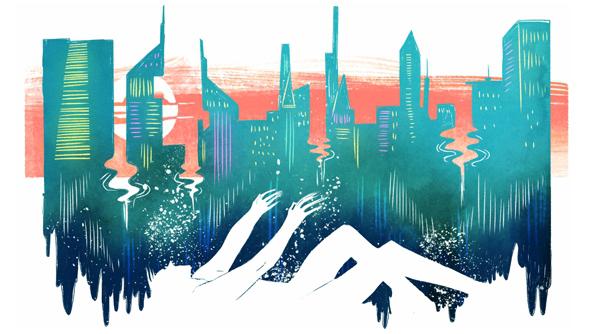The Dog, Joseph O’Neill’s bleak and funny new novel, is many things: a confession, a businessman’s handbook to Dubai, a cautionary tale of exile. Our lawyer narrator has fled New York after a traumatic breakup, seeking “a remote solitary fate causing shame and inconvenience to no one.” He’s landed in Dubai, working as a trustee for a Lebanese family so rich they have their own in-home HSBC ATM. When an American acquaintance goes missing and is suspected of leading a double life, our guy in Dubai is drawn into the mystery. But his real goal, it seems, is absolute self-effacement.
For the Batros family, O’Neill’s narrator executes insufferably boring financial and legal transactions that carry terrifyingly great liability. No matter how hard he tries to delimit his responsibility, it’s clear, four years in, that he is at his employers’ mercy. The daily highlights of his desk-bound existence are masturbation, bowel movements, and evening hours in a massage chair. If this sounds like white-collar prison, you won’t be surprised that the novel reads like the notes of a condemned man.
First there are the protests against his employers. The unnamed narrator, whom I’ll call G., the first initial of the false name he uses for rendezvous with prostitutes, spends much of his day “mental mailing,” drafting censorious emails that remain untyped because they’d have no effect:
Sandro—You cannot involve me in your yachting arrangements so long as you require me knowingly to make false representations to the crew.
I can only repeat that it is currently impossible to purchase Maltese citizenship for your cousins….I am ruled by the facts of the world.
Another fact of the world is that all foreigners in the United Arab Emirates are guests, their temporary stays reliant on work visas. Membership in the expat professional class also compels one, sooner or later, to confront other discriminations, the worst of which is the lack of protections afforded migrant workers. Another, less well known, is the plight of the stateless bidoons, a population originally from elsewhere in Arabia (particularly Iran) who were never granted citizenship when the UAE formed in 1971. G. defends his deliberate ignorance of these unfortunates, including Ali, a bidoon in his personal employ, with precise, pages-long moral exculpations. Why is he blameless? Because he cannot fix it.
Over the course of the novel, it becomes clear that G.’s defensive exertions are not only exercise for a legally trained mind, but also the afterburn of a breakup. The disaster of his relationship to Jenn was that of a couple who goes to great lengths to have children, with one member more conceding than agreeing until he realizes, too late, that he cannot go through with it. “You’ve murdered my marriage!” Jenn charged G., and so sensitively does O’Neill present the complexities of the situation that G.’s grief and fury when remembering this moment are moving.
Though Jenn acted badly, G. blames himself for his exile:
Chronic self-misrepresentation and inner absenteeism are inconsistent with the performance of the duties of a loving partner. They make a wrongdoer of one, and it must be the exceptional wrongdoer who does not of his or her own volition inhabit a place of fault and penalty.
O’Neill is a brilliant stylist. However, the unrelenting density of the prose in this novel can be exhausting. It’s hard to appreciate a perfectly crystallized moment when O’Neill so quickly vaults into the next packed description. Some of G.’s digressions end with five or six closing parentheses. The pace, force, and length of the narrator’s thoughts reveal an angry man who feels trapped. But these assaults also distance the reader and reduce our patience with G.’s passivity.
G.’s foil is the missing Ted Wilson. Wilson lived two floors above G. in the Situation, a luxury apartment building on Privilege Bay, and has been apart from his Chicago-based wife for two years. Wilson’s disappearance, supposedly to Sharjah (the emirate next door) with his new Filipina wife and their young child, obsesses G. He takes part in organized search parties and conducts his own online reconnaissance. The Facebook-posted accusation that Wilson is a “two-timing maniac” provokes G. to launch a long defense of Wilson that, somehow, ends with the words, “Jenn, I’m so sorry.”
G.’s guilt leads him to seek moments of weightlessness, and he seeks them underwater. Reminiscent of the evocative sprawl of O’Neill’s 2008 masterpiece Netherland, The Dog’s mesmerizing opening begins the novel’s exploration of the appeals of the silent deep to a man in dire need of nothingness:
Perhaps because of my growing sense of the inefficiency of life lived on land and in air, of my growing sense that the accumulation of experience amounts, when all is said and done and pondered, simply to extra weight, so that one ends up dragging oneself around as if imprisoned in one of those Winnie the Pooh suits of explorers of the deep, I took up diving.
For G., life undersea is a liberation because it limits “what might be termed the biographical import of life—the momentousness to which one’s every drawing of breath seems damned.”
This is powerful and beautiful, and yet there is something missing. Of this undersea world, one presumably bursting with marvels, G. describes nothing of what he sees. In some ways diving is meant to create the emotional framework for this novel that cricket did for Netherland. But unlike the tactile exuberance of that book’s incisive depictions of immigrant life and Staten Island cricket pitches, G.’s Dubai descriptions read like a sardonic guide for rich Western men. There are a few wonderful set pieces featuring pretend-busy Emirati youth at the Dubai Mall and the Dubai Museum, whose dioramas of pearl divers (pre-1950s oil discovery) are such a throwback they’re almost charming. But these sequences are location shots.
Additionally, much of the novel is populated not with scenes but with “only-in-Dubai” stories, though G. professes to be sick of them. At one point he delivers a “taxonomy of ex-pat chatter,” including “judicial mistreatment of raped women” and, forebodingly, “official injustices done to high-net-worth expats.” O’Neill is clearly trying to replicate life in a rumor-based “abracadabrapolis.” Yet this material sometimes reads as gimmicky, undermining O’Neill’s efforts to portray a man in crisis. The lack of day-to-day Dubai scenes and the wealth of second-hand anecdotes keep us at arm’s length from G. just at the moments when we want to understand him better.
So where do we accompany G.? As he can’t live for more than an hour or two underwater, G. finds the next best non-place to pass his self-imposed imprisonment: the Internet. His greatest online pleasures are illegal porn sites, but he also develops a nuanced appreciation for some virtual communities. He’s surprised to find on Facebook, for example, public yet tender exchanges between Wilson and his first wife. G.’s online investigations yield a fascinating insight, one that marks the novel as a worthy exploration of our time: The Internet is not less real, in many ways, than a city like Dubai. Both feature few real-time, human interactions; illicit pleasure ignored by authorities; and places whose landscapes and structures, when examined closely, turn out to be either mirages or architectural mock-ups.

Photo courtesy of Joseph O‘Neil.
The problem with both the real and virtual worlds is that neither can provide G. with an escape from his own past. Just as in his nine-year relationship, on the Internet one can quickly be kicked from marital bed to doghouse. In the wake of the rumor of his affair, Ted Wilson’s friendly Facebook wall attracts messages of hate. When G. googles himself after his break-up, the search box autocompletes after his name sexual harassment, embezzlement, tiny cock.
The Dog is a vertiginous story of falling. One can see why G. wishes to be gravity-free, for “a life neither in the right nor the wrong.” So when the shady Batros dealings threaten to ruin his already once-defamed reputation, what should G. do? Is he truly blameless? Is a good—or at least decent—name worth fighting for, even if it means becoming vulnerable and homeless like the bidoons? At what point does such an unfixed, inconsequential life cease to be worth living—or at least reading about?
—
The Dog by Joseph O’Neill. Pantheon.
See all the pieces in this month’s Slate Book Review.
Sign up for the Slate Book Review monthly newsletter.
